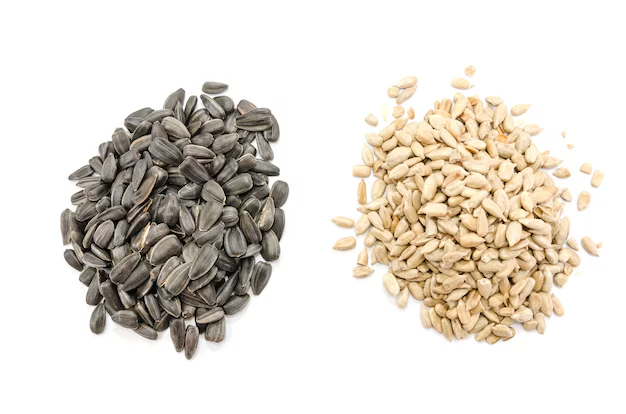No products in the cart.
Pilled & unpilled sunflower seed
$1.74 Original price was: $1.74.$1.34Current price is: $1.34.
Category: Pilled & unpilled sunflower seed
The terms “pilled” and “unpilled” in the context of sunflower seeds usually refer to whether the hull (or shell) of the seed is intact or removed.
- Unpilled Sunflower Seeds: These are the whole sunflower seeds, with the black and white striped outer shell still surrounding the kernel. They are often sold as a snack that requires cracking open with your teeth to access the edible seed inside.
- Pilled Sunflower Seeds: These are sunflower kernels that have had their outer shell removed. They are ready to eat directly and are commonly used as an ingredient in various food products. “Pilled” is less common terminology; “shelled” or “hulled” are more frequently used terms for sunflower seeds without their shells.
Uses of Sunflower Seeds (Both Pilled & Unpilled):
Sunflower seeds, in both forms, are incredibly versatile:
As a Snack:
- Unpilled: A popular snack, often roasted and salted. The act of cracking them open can slow down consumption.
- Pilled (Shelled/Hulled): A convenient and quick snack, available raw or roasted, salted or unsalted, and in various flavored options.
In Culinary Applications:
- Toppings: Pilled seeds add a crunchy texture to salads, yogurt, oatmeal, and smoothie bowls.
- Baking: Pilled seeds are incorporated into bread, muffins, granola bars, cookies, and other baked goods for added flavor and texture.
- Granola and Trail Mix: A common ingredient in both homemade and commercial mixes.
- Stir-fries and Vegetable Dishes: Pilled seeds can be sprinkled over stir-fries and roasted vegetables.
- Dips and Sauces: Ground pilled seeds can add thickness and nuttiness to pesto, hummus, and other sauces.
- Garnish: Both pilled and sometimes partially cracked unpilled seeds can be used as a garnish.
- Sunflower Seed Butter: Pilled seeds are ground to make a nut-free alternative to peanut or almond butter.
- Sunflower Seed Oil: Pilled seeds are pressed to extract a healthy cooking oil.
Other Uses:
- Bird Feed: Both pilled and unpilled seeds are used in birdseed mixes.
- Animal Feed: Sunflower seeds can be part of livestock feed.
Advantages of Sunflower Seeds (Both Pilled & Unpilled):
Sunflower seeds are a nutritional powerhouse, offering numerous health benefits:
- Nutrient-Rich: They are excellent sources of Vitamin E, magnesium, phosphorus, copper, manganese, selenium, and B vitamins.
- High in Healthy Fats: They contain beneficial monounsaturated and polyunsaturated fats, including linoleic acid.
- Good Source of Protein: Contribute to daily protein intake, important for muscle health.
- Rich in Fiber: Aid in digestion and promote feelings of fullness.
- Antioxidant Properties: Vitamin E, flavonoids, and other plant compounds act as antioxidants, protecting cells from damage.
- May Support Heart Health: Healthy fats, fiber, magnesium, and potassium can help lower blood pressure and cholesterol levels.
- May Support the Immune System: Zinc and selenium in sunflower seeds play vital roles in immune function.
- May Boost Energy Levels: B vitamins, protein, and healthy fats contribute to sustained energy.
- May Reduce Inflammation: Vitamin E and other compounds have anti-inflammatory effects.
- May Help Manage Blood Sugar: Some studies suggest they can help lower fasting blood sugar levels.
- Allergy-Friendly (Pilled): Sunflower seed butter is often a safe alternative for people with nut allergies.
Disadvantages of Sunflower Seeds (Both Pilled & Unpilled):
While generally healthy, there are some potential drawbacks:
- High Calorie Content: Due to their fat content, they are calorie-dense, so portion control is important.
- High Sodium Content (Salted Varieties): Many commercially available roasted unpilled seeds are heavily salted, contributing to high sodium intake. Pilled seeds can also be salted.
- Potential for Digestive Issues: Consuming large amounts, especially if not used to a high-fiber diet, can cause bloating, gas, and diarrhea.
- Phytic Acid Content: They contain phytic acid, which can inhibit the absorption of certain minerals. Soaking or roasting can help reduce this.
- Allergies: Sunflower seed allergies, though less common than nut allergies, can occur.
- Risk of Fecal Impaction (Unpilled): Consuming large amounts of unpilled seeds without properly chewing and swallowing just the kernel can potentially lead to fecal impaction due to the indigestible shells.
- Cadmium Content: Sunflowers can absorb cadmium from the soil, which can accumulate in the seeds. Moderate consumption is generally not a concern, but very high, long-term intake could pose a risk to kidney function.
- Omega-6 Imbalance: Sunflower seeds are high in omega-6 fatty acids. While essential, an excessive intake without enough omega-3s can contribute to inflammation in some individuals.
- Dental Issues (Unpilled): Regularly cracking open unpilled seeds with your teeth can potentially lead to enamel erosion or cracked teeth over time.
- Rancidity: Due to their high fat content, sunflower seeds can become rancid if stored improperly for extended periods.
In summary: Both pilled and unpilled sunflower seeds offer significant nutritional benefits and culinary versatility. The choice between them often comes down to convenience (pilled) versus the slower pace and potential for lower calorie intake during snacking (unpilled), as well as personal preference. Moderation is key to enjoying their advantages while minimizing potential disadvantages.


Reviews
There are no reviews yet.